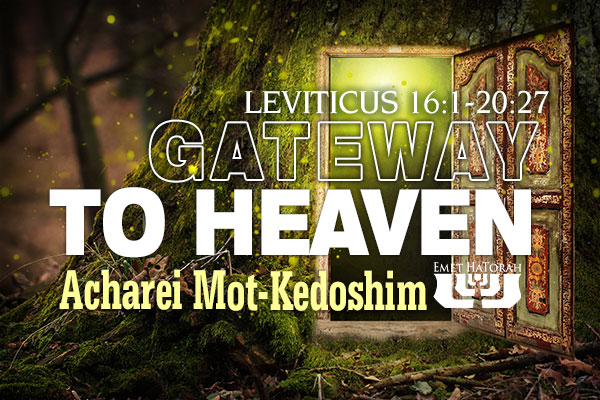Parashat Acharei Mot-Kedoshim - Leviticus 16:1-20:27
Series:

This week’s double portion of Acharei Mot and Kedoshim covers a lot of ground in a small amount of space. It covers the ritual of Yom Kippur (Day of Atonement), restrictions on where and how sacrifices can be made, proscriptions for the resident alien, a list of prohibited sexual relations, a stern reminder about honoring one’s parents, issues of social justice, a detailed explanation of how to love one’s neighbor, and a miscellaneous list of other commandments ranging from agricultural laws to prohibitions against sorcery and child sacrifice. Needless to say, there is a lot to absorb in this week’s dosage of Torah. Let’s take a look at one concept associated with Yom Kippur.
The focal point of the Yom Kippur service is the two goats. The first is designated as a sin offering, while the second carries with it the iniquities of the Children of Israel into the wilderness. However, most people are confused as to the purpose of the first goat. It is commonly thought that the sacrifice of this goat designated as a “sin offering” was for the purpose of removing sin from the Children of Israel. And passages in the book of Hebrews alluding to the Yom Kippur service complicate matters even further. However, if we look at the prescription for this goat within the Yom Kippur service, we find that it serves an entirely different purpose:
Then he shall kill the goat of the sin offering that is for the people and bring its blood inside the veil and do with its blood as he did with the blood of the bull, sprinkling it over the mercy seat and in front of the mercy seat. Thus he shall make atonement for the Holy Place, because of the uncleannesses of the people of Israel and because of their transgressions, all their sins. And so he shall do for the tent of meeting, which dwells with them in the midst of their uncleannesses. (Leviticus 16:15–16)
Rather than being used to cleanse the people from their sins, the blood of the first goat of Yom Kippur was used for the purpose of “atoning for the Holy Place and the tent of meeting and the altar” (vs. 20). It was used to remove the contamination of sins from the Tabernacle, the Ark of the Covenant, and the Bronze Altar (vs. 15–19).
The Tabernacle functioned something akin to a bridge or a gateway that served as a link between heaven and earth, allowing for the interaction between God and man, as it is written, “And let them make me a sanctuary, that I may dwell in their midst” (Exodus 25:8). This portal, however, was susceptible to contamination. This corridor between heaven and earth was so important that it had to remain accessible, and therefore it had to be periodically cleansed. Every year the Yom Kippur ritual was performed in order to purge the Tabernacle and its furnishings from the accumulation of the “uncleannesses of the people of Israel” (vs. 19), in order that this bridge between God and man not be corrupted.
Since we live in a time when the Holy Temple is not functioning, it is easy to forget about the detailed process of purification undertaken each year to ensure the gateway to heaven would be free from any spiritual debris that might restrict the flow of the Divine Presence into this world. However, we can carry this reminder into our daily lives. The Apostolic Scriptures portray disciples of Yeshua as miniature temples who house the Spirit of the Most High and carry His presence into the world. Paul reminds the believers at Corinth:
Do you not know that you are God's temple and that God's Spirit dwells in you? … For God's temple is holy, and you are that temple. (1 Corinthians 3:16–17)
As disciples of Yeshua we are connecting points between heaven and earth. We can either aid the flow of holiness and godliness in this world, or we can obstruct it. If we allow the muck of the world to cling to us, then we will restrict the flow of Hashem’s Presence in this world. However, John reminds his disciples, “If we confess our sins, he is faithful and just to forgive us our sins and to cleanse us from all unrighteousness” (1 John 1:9). If we do not harbor sin, but continually confess and forsake our shortcomings in the light of the Risen Messiah, we have an enormous potential to be a gateway to heaven that will flood the earth with the Divine Presence of our Creator.








